| Cruising the Istrian Peninsula
of Croatia - 2 ... |
|
Croatian history has much
evidence of Roman influence, and this
is particularly evident in Istria, being just 40 miles across the
Adriatic from Venice. We chose to only look at a few of the interesting
sights in Pula, but there were a number of other towns with significant
features well worth a visit. It would have taken at least a couple of
days to explore each of these thoroughly. Unfortunately, we hadn't the
time to do this, and we therefore bypassed the marinas of each of the
other main towns.
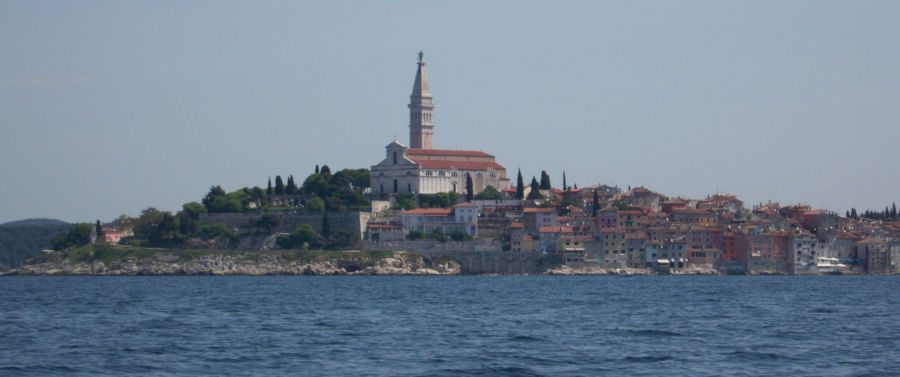 The
grand and impressive church of Rovinj, which dominates the skyline
of this historic town. - click here for larger image
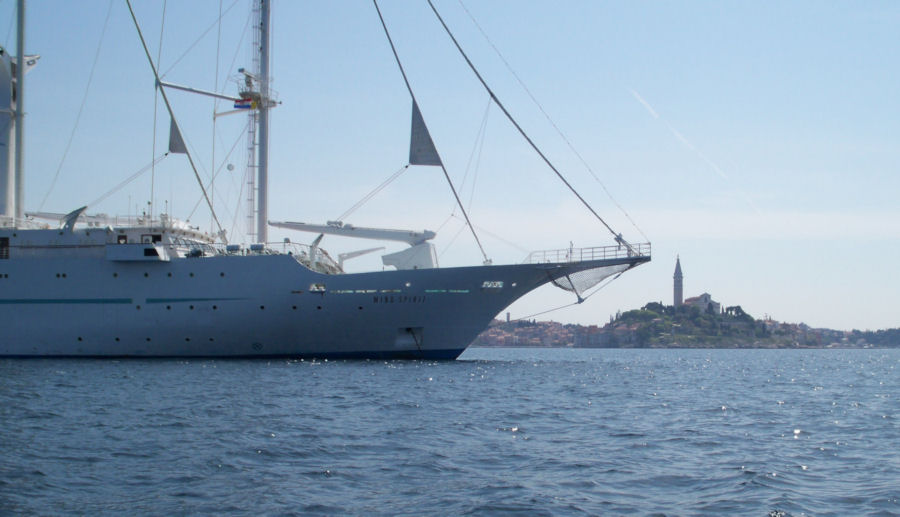 The
sleek schooner Wind Spirit
moored off Rovinj - though it didn't
appear to be too reliant on
its sails for power!
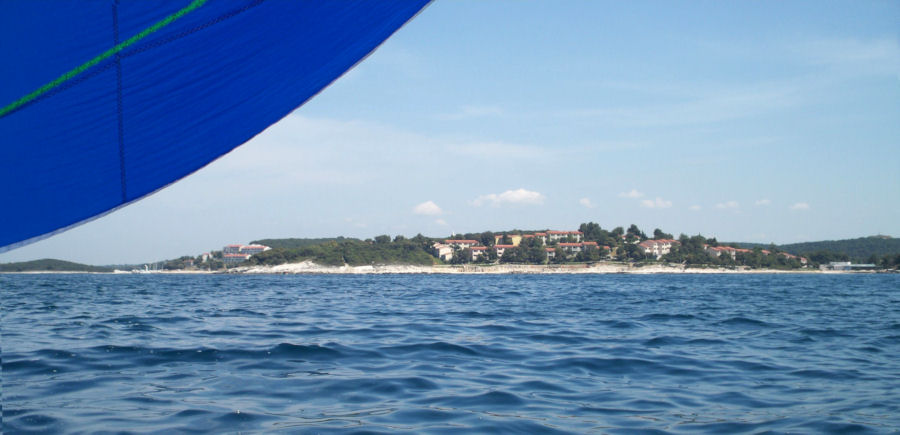 Passing
the town of Porec - one of the many fine
major towns along this part of the coast. - click here for larger image
The western part of the Istrian
peninsula is amongst the most
scenic places I have sailed, with many islands, bays and inlets along
its
entire length. The towns or smaller fishing communities, having been
built up where the coastline has provided a natural shelter, were all
in character with the traditions of the region. Current development of
the shoreline is related to the tourist industry with the building of
numerous campsites, many for overseas naturists. As these were usually
well secluded and landscaped, they did not despoil the view. (The
campsites that is, rather than the naturists!) With both the scenic
nature of the coast, as well the ideal sailing conditions - which
can be seen by the sea state in the photos below - the sailing
along this part of the coastline proved to be about as easy and
pleasurable as it is possible for it to get.
 This
group of islands was just off the coast from Vestar. A larger
group of islands, just to the north of Pula
make up the Brujuni National Park. - click here for larger image 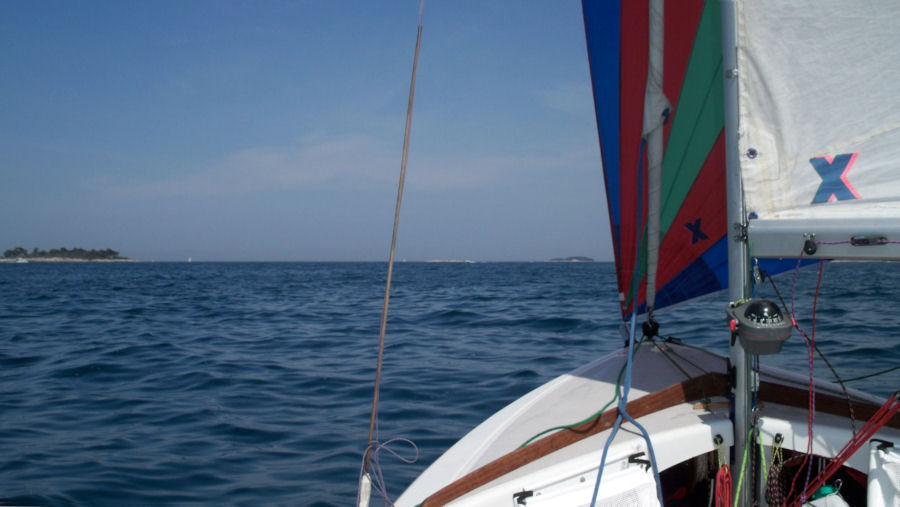 We
flew the asymmetric spinnaker for the latter part of the
Croatian coastline.
There were very few other boats out to enjoy the fabulous sailing. The sun shone constantly for
the whole trip. The wind conditions
however, were quite variable during the day, with the breeze often
dying
out around noon, even to the extent of our barely making any progress
through the water, before it picked up again an hour or so later. The
wind blew consistently from the south-west, often a modest F3, so the
conditions overall couldn't have been more ideal.
Our overnight stopping places
varied considerably, and it was
probably quite an education for Jacques as to the possibility (or
otherwise) of places to camp for the night. Our preference was to pull
the boat ashore whenever this facility was available.
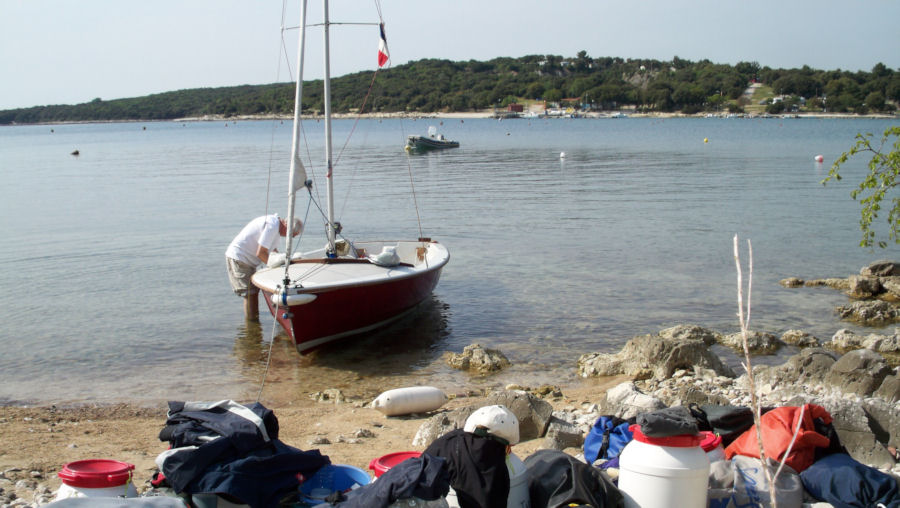 We
took out as much gear from the boat as was conveniently possible to
reduce the weight,
before using the fenders to roll it up the shore. - click here for larger image 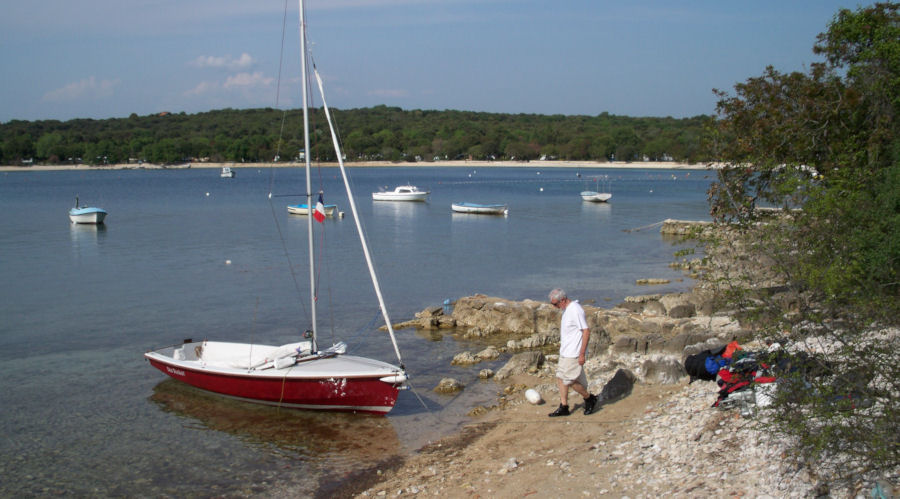 When
there was nowhere to attach the kicker to haul the boat ashore, we placed a
number of
large rocks on top of one of our anchors to hold it in place. - click here for larger image 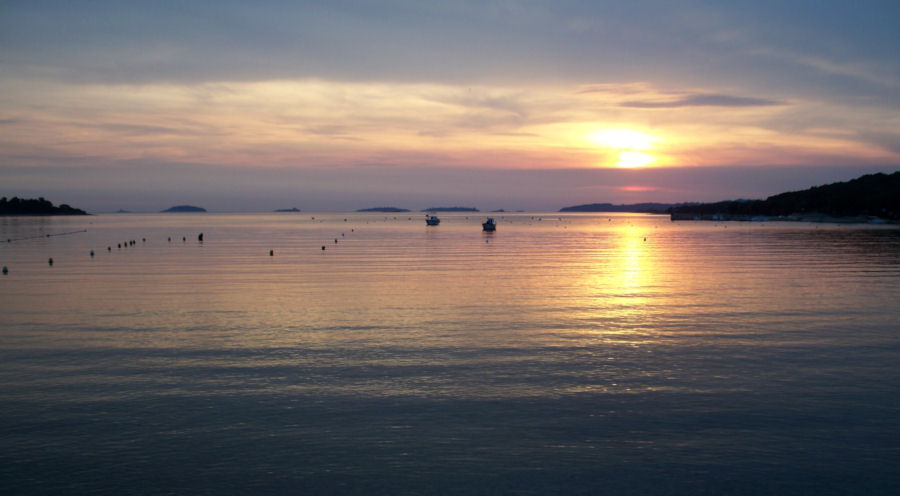 Sunset
over the Adriatic at Vestar, near Rovinj. Photo taken after we
had returned from an excellent evening meal
at a nearby taverna across the bay. - click here for larger image There were a number of places
along this part of the coast
where it was easy to stop at a taverna to enjoy either a cold beer
and/or an excellent meal. Two particularly memorable stops were
at Funtuna and Sv Marina, where the food and the ambience of the
restaurants were exceptional.
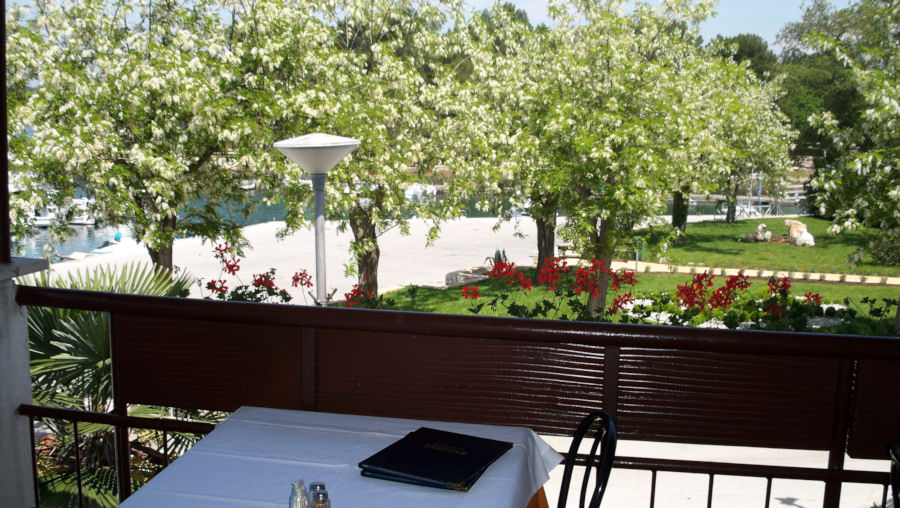 Photo
taken from the balcony of the restaurant overlooking the harbour
at Funtuna, where we stopped for lunch.
We would have stayed for rather longer but for the fact that it was such a beautiful day to sail. We made a stop in the small
fishing port at Sv Marina which was not the most
attractive of places we had called at, but we were able to use the
nearby marina at Cervar Porat to restock our food or water supplies,
and the sight and smell of the food being cooked at the local taverna
persuaded us to delay our start the next day until after lunch.
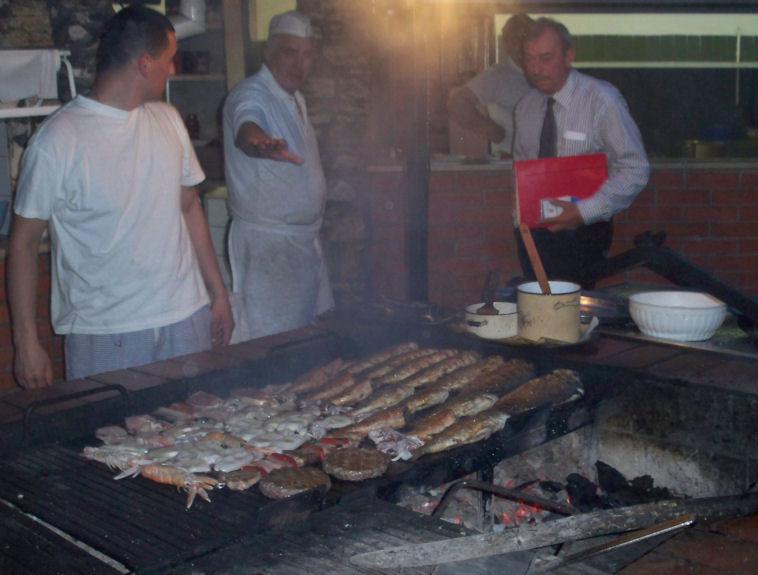 The
aroma from the freshly caught fish being cooked on the BBQ was
enough to lure anyone into the taverna.
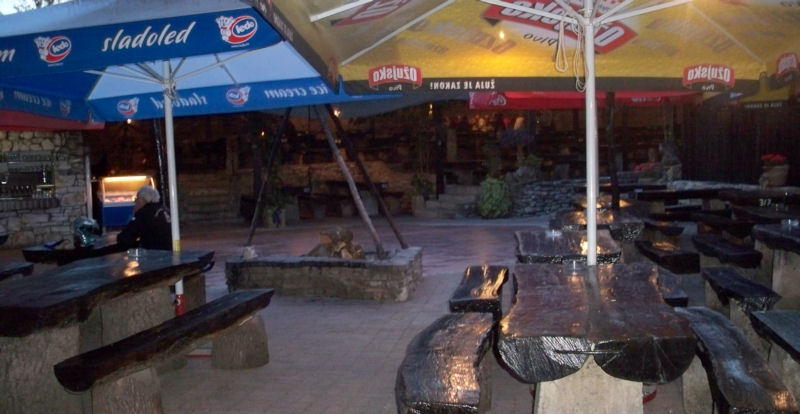 It
is not possible to capture the ambience of a place in a photo, and
this shot, taken in the evening barely does the taverna justice.
It was only as we reached the
more northerly part of the
Istrian coastline that we experienced some difficulty in finding a
suitable place to stop for the night. This was as much due to the many
developments along the shoreline, particularly campsites, as the
unfriendly nature of the rocks. We did call in to one campsite to ask
for permission to stop for the night, but Jacques was turned down with
a brusque 'niet' by the German lady manager. This proved fortuitous,
since with the subsequent strong winds during the night, it would have
been a less than ideal anchorage. An hour or so later we found a much
better place to stop, in a bay of the small town of Savudrija.
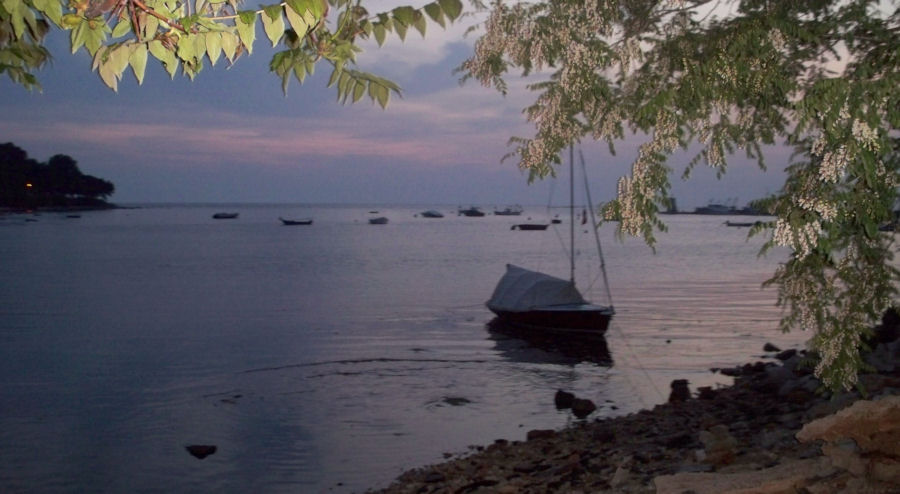 Sea Rocket anchored in the bay of the small fishing
hamlet of
Savudrija. This mooring offered
greater shelter than could be found amongst the jetties in the main harbour. 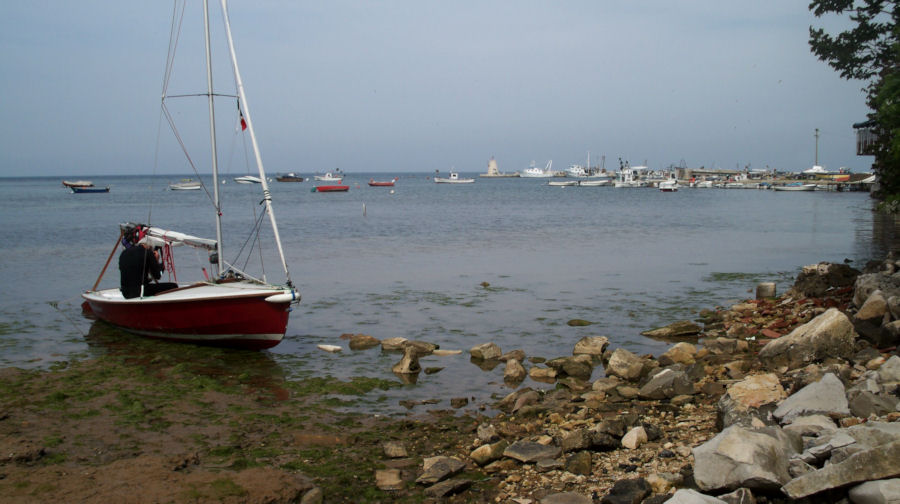 At
anchor the next morning, with the tide flooding back in. We laid a
series of
stones out to the boat
to save getting our feet covered in mud, which Jacques termed a 'Roman Way'. - click here for larger image We had preferred to find quiet,
isolated places to stop along the
coast, rather than use the marinas available, even though it
meant forfeiting what would have been the very welcome use of the
facilities a marina provides. The above place proved to be an ideal
quiet spot, having handy access to the town as well. With the rocky
shoreline giving way to mud at low water in this shallow part of the
bay, the rise and fall in the water level was of greater significance
here. We took along a land tent, but never used it, since finding a
suitable
place to erect it, particularly with the rocky subsoil, was always too
much of a problem. It was easier and more convenient to use the boat
tent.
Slovenia has only a 25-mile
section of shoreline,
squeezed between the extensive coasts of Croatia and Italy. We chose to
sail straight to the large Italian port of Trieste, rather than land
anywhere in between, since we had no Slovenian currency, and no licence
to sail the coast - should this have been needed. A cruising licence
had been required by Croatian officialdom, at a cost of around
£35 for the permit.
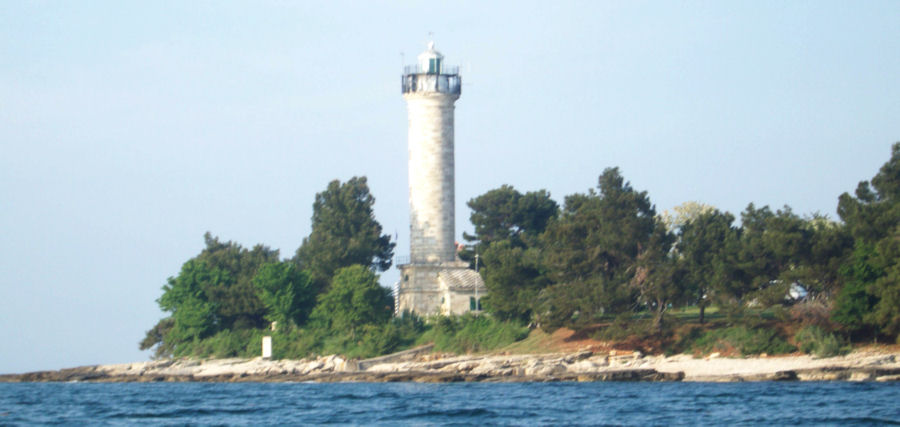 The
lighthouse on the headland of Rt Savudrija marks the most
north-westerly point of the Istrian Peninsula.
We started out from Savudrija
in strong winds, and once away from the
shelter of the shore, quickly put two reefs in the mainsail. This gave
us a fast and exhilarating sail for the next hour, until the wind
slowly died - eventually to a near calm. We spent the next hour or more
virtually just drifting along before the wind began to pick up again,
gradually increasing in strength to near gale force again.
Our first impression of the
Italian coast was a mass of buoys covering
a large area of water, containing the nets of fish farms. With it
blowing a near gale, and our passage along the coast into Trieste
looking to be completely blocked, it was quite an alarming sight.
Eventually a passage through the buoys did appear, and it was with some
relief that we reached a marina at Muggia (opposite Trieste) safely.
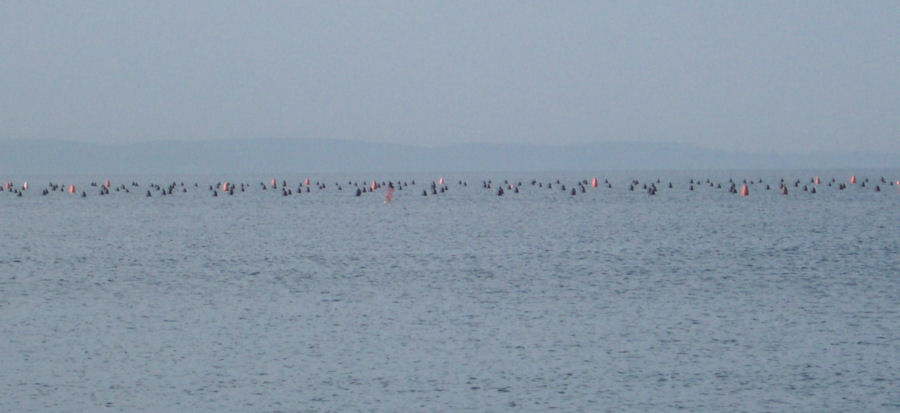 The
mass of buoys marking one of a number of fish farms along the
Italian coast. (Photo taken a few days later
further along the coast from Muggia, when conditions were much calmer) - click here for larger image The Italian coastline proved to
be far more developed, and
almost the only suitable overnight stopping places we could find were
municipal marinas. There was no one to pay at each marina for the
overnight stop - not without going into Trieste to find the relevant
municipal department, which was somewhat impractical for us.
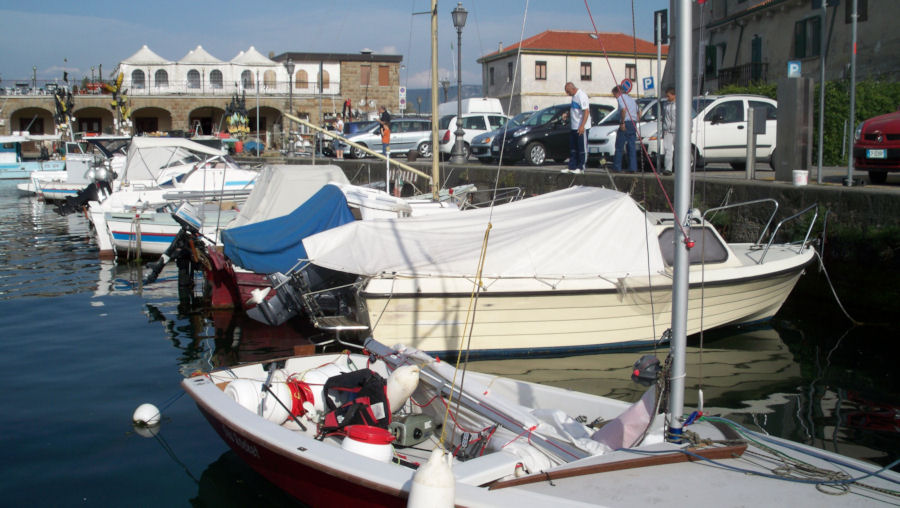 Moored
in a convenient corner of the local municipal marina in the town
of Muggia, opposite Trieste.
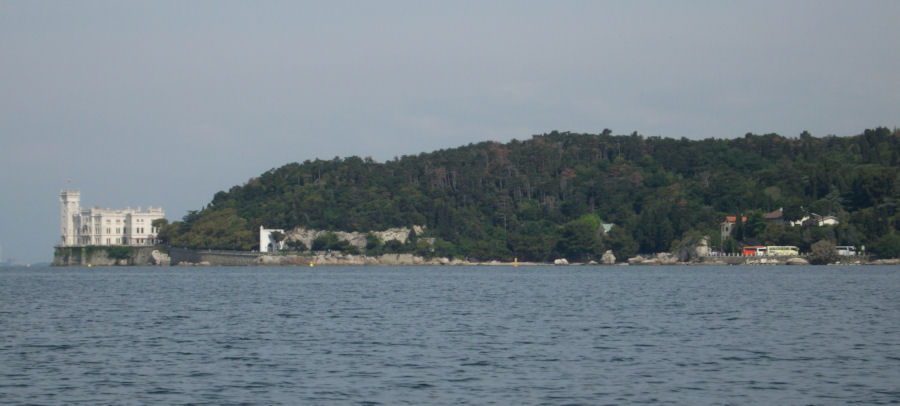 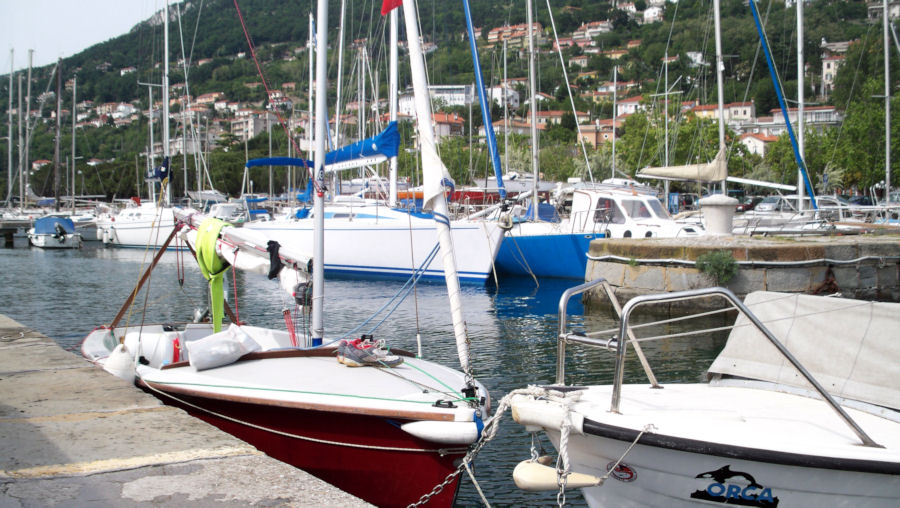 Moored
at the municipal marina in the Trieste
suburb of Barcola - only a local fisherman
seemed to object to our unauthorised presence. - click here for larger image The only downside of these
marinas was that they lacked any facilities,
which we would have willingly paid for after 10 days of very basic
living, and they were also pretty noisy, being near to the bustle of
town traffic, or in the case of this last one, a disco, the boom of the
deep base beat of each track going on until around 4 a.m.
Our sail along the Italian
coast was an extremely leisurely
affair, with the wind at most only a very gentle breeze. We finished
our cruise at the marina of Sistiana, which had a convenient slip to
enable us to haul out the boat. This marina was a little north of our
intended finishing point of Trieste, but conveniently nearer to the
airport that I had flown into for the trip with Jacques.
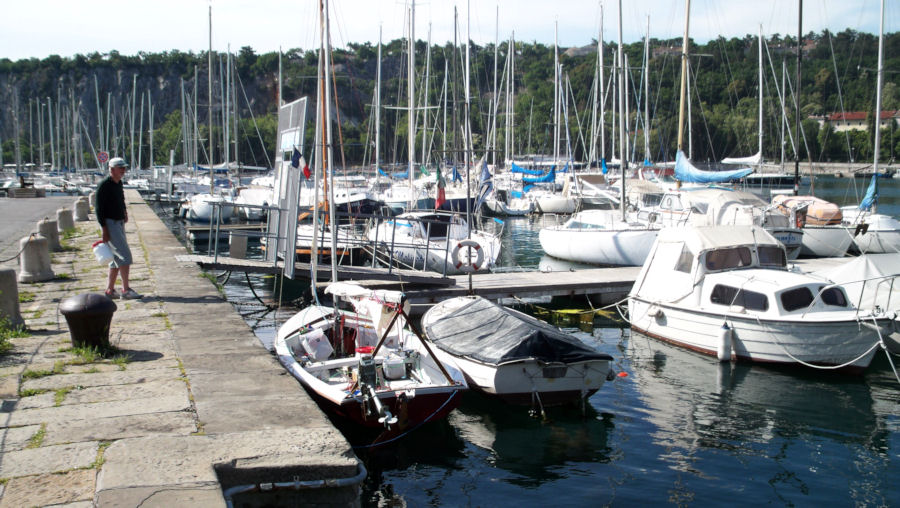 Moored up at
a convenient spot at the municipal marina of Sistiana.
We stayed there for two nights without anyone enquiring about our presence. 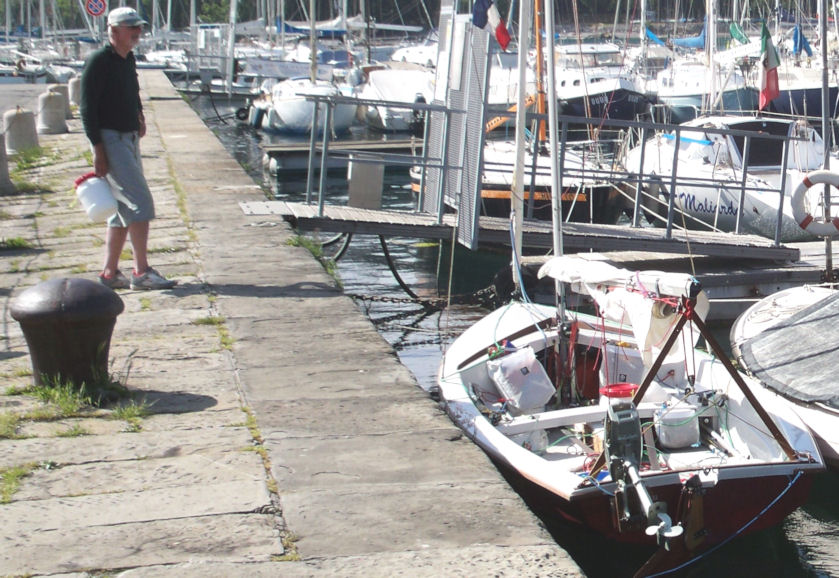 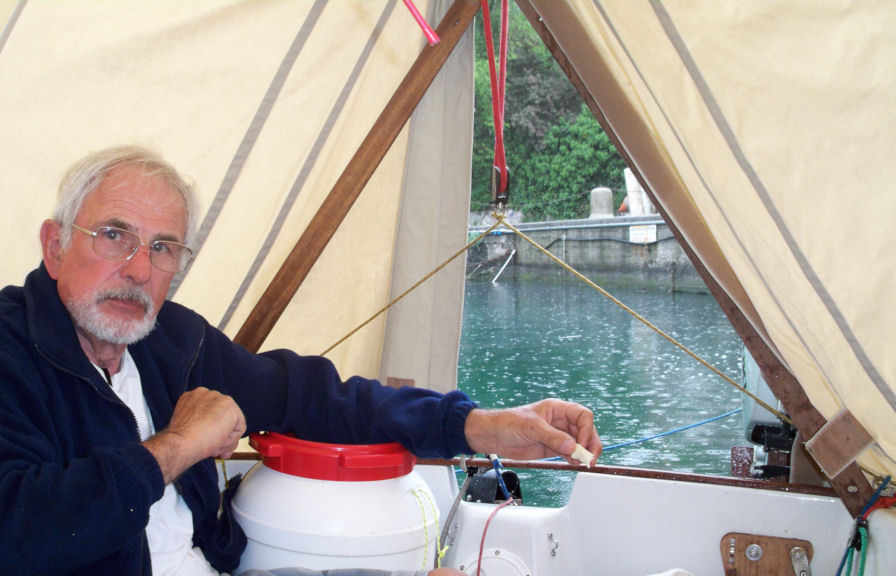 Jacques
sheltering from the rain inside his boat tent at the marina in
Sistiana, after returning from Opatija with his car and trailer.
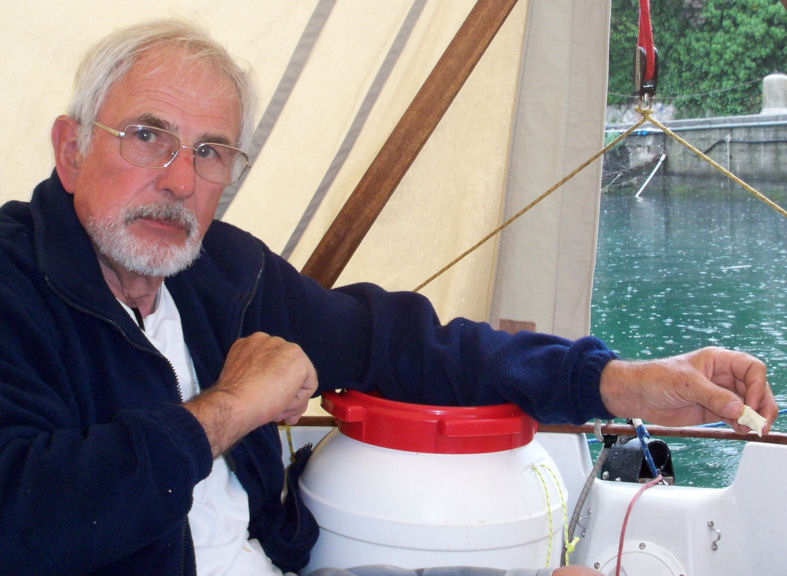 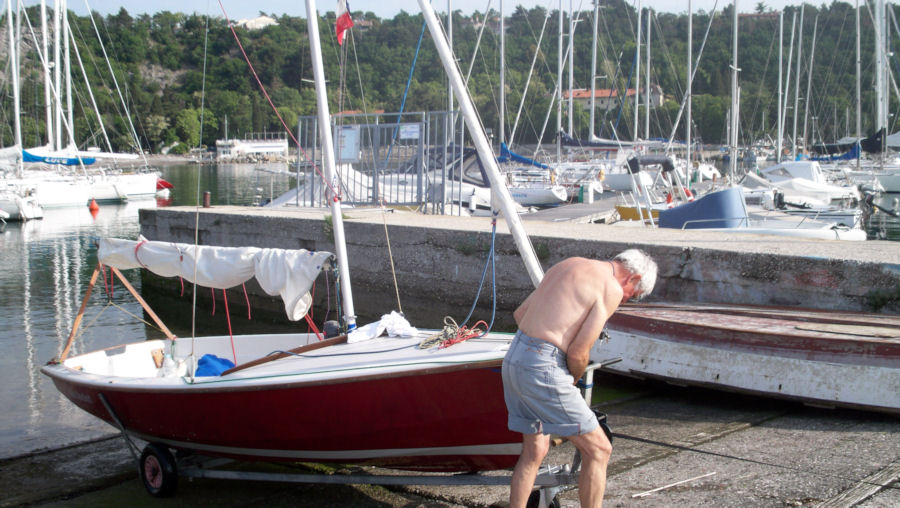 Jacques
secures his boat to the trolley, prior to loading it on the
trailer.
Unusually, there was completely free access to the use of the slipway. This was my third cruise along
the Croatian coastline, and it
was equally as memorable as the previous two. The Adriatic is as ideal
for cruising as anywhere I have sailed, and for this trip, the weather
for the trip could barely have been more perfect. Each day had been
fine, usually with glorious sunshine and a cloudless sky. The only rain
we had was on our last day, after Jacques had set off to collect his
car and trailer from Opatija. It had been little hardship to stay
with the boat, and while away the time sheltering in one of the
harbour's bars.
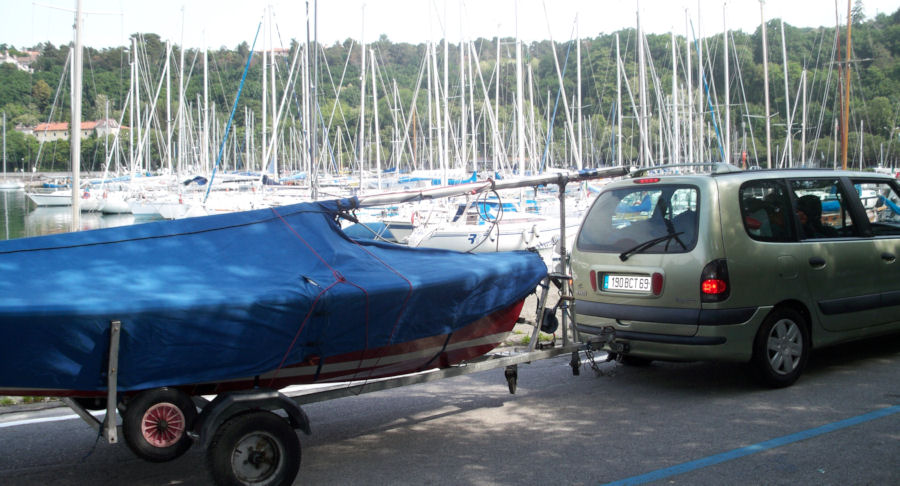 The
boat packed up and ready to leave the marina at Sistriana for the
long drive back to Lyon.
The weather had brightened up by the late afternoon. Jacques had been somewhat
apprehensive about this cruising venture, and
his anxiety level had increased after being given grave warnings about
the consequences of the very strong northerly Bura wind suddenly
blowing up. The harbourmaster in Opatija had been particularly
scathing about what he considered to be our chances of survival should
we encounter this wind in such a small boat. On Jacques' return to pick
up his car and trailer, the harbourmaster's response when told we had
safely reached Sistiana was: "Well, you must have been extremely
lucky!"
However our success was not
entirely due to luck. We were sailing what
must be one of the most seaworthy five-metre dinghies ever designed,
and
with suitable sailing experience, it is as safe to cruise this
coastline as it would be in a larger yacht.
Ralph Roberts W9885 (but sailing Jacque Boirie's boat - W9933) *My sincere thanks to Mato for
his considerable support in this
venture, and to his grandmother, Sonja for providing us with great
hospitality, without this assistance our trip would have been much more
difficult to accomplish so successfully.
My thanks also to Chris Ridley for his hospitality, particularly for taking us around some of the sights of Pula, as well as his help in getting some necessary repairs done to the boat. And a different perspective of the trip:
Istrian cruising notes from Victor! About
packing: What to take, or not to take - that was the question. A
big pile of bags on the marina pontoon and a grinning crowd in the
restaurant overlooking the battlefield - wondering how on earth all
that kit was going to be put in such a small boat - made me think
something was wrong. Do it again…..
How to memorise in which bag were the things you would need, as soon as you sealed each waterproof bag. For a person like me who permanently loses keys, it was a difficult exercise. However, in a small boat you soon learn where to put a toothbrush or any other essential item. Adding to the difficulties, the "essential" items varied as the time went along…. About expertise: After being hosted in an Eden-like house overlooking the sea in Opatia - near Rijeka, (this belonged to Mato's Grandmother - Mato being our Croatian Wayfarer contact), it was time to go. My natural anxiety was reaching a climax. The harbour master contributed and made it worse when I questioned him about the weather forecast. The answer was brutal: "There is no weather forecast where you go, the wind is unpredictable, it can go from nothing to force 6/7 in a few minutes." So I timidly asked whether the VHF would be of any use. He replied that there was no VHF support in the area. My face was as white as a British citizen's skin when he first gets exposed to the sun. I finally wrote down a telephone number, the only chance to be rescued in a "few hours time" according to the harbourmaster - from Reykjavik! The Bura (a violent wind from the north) was the enemy, and the man did not take much precaution in explaining that we were completely crazy to attempt such a trip in a boat of this size. No need to say that my blind confidence in the Captain's experience was shaken to the roots. We did experience the Bura the same day: in the middle of
nowhere with
a dark sea around. One feels very small in a little boat with few
chances to stay alive. Thanks to the work to be done on board, there is
no time to think about how nice life was just a few hours back ….
More about expertise: At the beginning of this fabulous adventure, I did not realize what was really involved in the navigation of a Wayfarer. In particular I could not anticipate the need to be an expert on building pyramids. This knowledge is mandatory if you expect to haul the boat up a sandy part of a rocky beach…Several days later I jumped abruptly from Egyptian art to Roman strategy and learnt how to build a Roman Way that takes you straight to the nearest pub from a Wayfarer sunk in the mud (more details to follow). 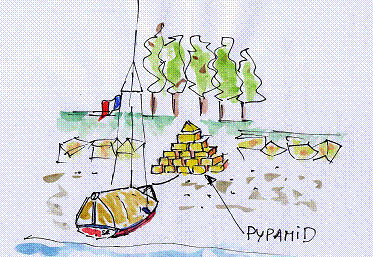 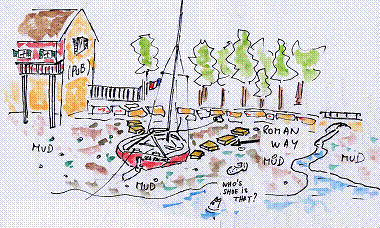 Sea Rocket on mud: This particular evening,
after hours of navigation,
we were confronted with a disstressing situation: there seemed to be
nowhere to
stop for the night. A last ditch attempt made by myself to convince the
camping lady manager to accept us for a night was turned down with
peremptory "NIET". Incidentally "niet" is not a Croatian word ("Ne" is
no in Croatian). A case of foreign investors, barring miles of
coastline for the "benefit" of a future generation?
Coming back to the Roman Way,
we ended up in a muddy, smelly area at
the back of a harbour. At first I could not understand the Captain's
position as he stated that this was the ideal place for a Wayfarer.
After
hard towing in the mud (where Captain lost one of his best technical
shoes), we finally came to a stop and anchored the boat on the
shoreline (no need for a pyramid this time, the shore, with various
bits of rubbish, offered appropriately armed concrete blocks to attach
the lines). The tide was significant there: how to get to the pub in
decent clothing and mud-free shoes after the tide had gone out? "No
problem," said the Captain, "I shall build a Roman Way for you." An
hour
later, in the dark, the crew could reach the pub dressed up like a city
dandy with shorts and varnished dancing shoes! Isn't that super
service….?
Food:
We are coming to a touchy subject for a Frenchman. It was
obvious
to me that no wine could be embarked in Sea Rocket. It was also obvious
that the little meths stove ("Trangia" - a magic word in the Wayfarer
community), although an excellent tool, could not handle a "gratin
dauphinois" or a "daube provençale". I had to accept this, but
it made
the menus dependent on the choice of lyophilised food offered in the
local supermarket - "soup" or "pasta". As a result, and to my wife's
pleased surprise, I lost 10 pounds. Fortunately, and to keep me in an
excellent mood, we did stop at excellent restaurants in Pula, and
various other ports. Special mention needs to be made of the fish
restaurant Santa Marina….Cheers,
Captain, we deserved the few good
drinks of wine as well.
Conclusions:
During the course of this marvellous trip, a number
of "GOLD STARS" were delivered to the Captain as a reward for
exceptional behaviour or initiatives, which I am pleased to list:
Jacques Boirie W9933
Footnote from the Captain!
Victor was the name Jacques was teased with
whenever he was pessimistic about any problems we faced on our trip.
(From Victor Meldrew, in Keeping up
Appearances).
|
| return to Cruise Logs index |